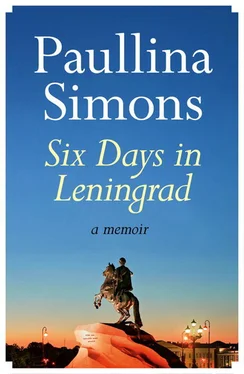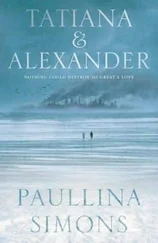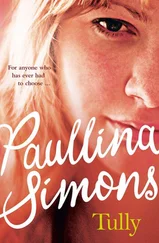My grandfather used to pour a bit of paraffin oil onto a plate, put a piece of wick in the middle and light the wick. When the oil ran out, it would be dark. All day, all night. He allowed himself only a tablespoon of paraffin oil every 24 hours. That was winter in 1941, no electricity and sundown all day — the flip side of the sublime white nights my father had asked me about.
My refrigerator was still not making ice, and the hot water dispenser still not dispensing hot water. When would the plumber come and fix that so I could be more comfortable in my home office, where I would write about three million people starving to death?
My grandfather and great-grandmother had to burn furniture for firewood in their portable ceramic stove that could have cooked some food had there been food to cook.
Sitting waiting, I wondered what the chances were I’d be fed pelmeni on the plane. Pelmeni is my favorite Russian food — meat dumplings in chicken broth. I also like mushroom barley soup, Russian potato salad, and caviar. Thinking of all this food, I realized I was STARVING.
What did a 3.8 ounce ration of bread look like?
I was anxiously excited about returning to Leningrad.
My mother, who had recently moved to Maui, said to me when she called as I was packing, “You know it upsets me when you don’t call me. I know you’re busy, I know you have children. But Paullina, you can have many many children, but you only have one mother.”
Who could argue with that logic? I wanted to say, Mama, I’m sorry but what about my latches? They’re too tight, and the doors don’t open properly. How can I call you when I have to take care of the latches?
My mother said, “Your father doesn’t like the title of your new book, The Bronze Horseman . He says it’s like calling a book Romeo and Juliet.”
“No, it isn’t. No one in America’s heard of Pushkin’s poem, The Bronze Horseman.”
“Well, I don’t think you should call your book Romeo and Juliet.”
I paused. “Okay, Mama, Um, I won’t.”
My mother told me she was jealous of my father’s and my going to Leningrad together. Without her. With a heavy sigh, she added, “Under different circumstances, I would have liked to come with you.”
I had no response to that except a, “Yeah, that would’ve been great.”
Back in 1991 my father, mother and sister drove down to Sanibel Island in Florida. I wasn’t allowed to go on that vacation with my family. My father said, “Paullina, I would love for you to come, but you and your mother, you know you just keep going at each other.”
When they had come back, I asked my sister how the vacation went. Liza rolled her eyes and said, “You wouldn’t believe it, they had the hugest fight about forgetting the sunglasses by the time we got to the bridge.”
I laughed, thinking it was pretty funny that by the time they got to the Verrazano Narrows Bridge, about an hour and a half drive from our house, with another two days of driving to go, they had already had a big fight.
“They had a fight on the Verrazano over dumb sunglasses?”
“What Verrazano?” Liza said. “They had a fight at the bridge crossing over the Long Island Expressway!”
Not a bridge, an overpass — a mile from our house.
They had to turn back to get the sunglasses.
So when my mother said to me she wished she could come with us to Russia too, I kept my mouth shut.
We were still on the ground an hour after scheduled departure. I could have walked from LaGuardia to Kennedy.
The missionaries had not materialized inside the main cabin yet.
In 1996 my parents bought a condo in Maui, and my mother suddenly moved there by herself in 1997. Which is why she couldn’t come with my father and me to St. Petersburg — because she moved to Maui by herself last November. Had she remained in Prague with my father, she would come with us to Russia.
God looks after us in ways we cannot fathom.
My father, who had been working at Radio Liberty in New York since the moment we set foot on American soil in 1973, planned to join her in Maui as soon as he retired in three weeks. He worked for RFE/RL’s New York bureau until Communism fell. The following year, in 1992, he was promoted to director of Russian Services for the entire multi-city operation and relocated to Munich and then Prague. My mother adjusted dismally to Europe, missing her life in America and becoming and staying blackly depressed. She was so lonely while he spent all his minutes working. The carrot dangling in front of her was his impending retirement when they would be able to spend all their time together.
You know what they say about why God answers your prayers.
In 1996 they went to Maui on a fact-finding holiday. They’d never been, so they went to see if they liked it, if it really was paradise on earth like the Internet said.
They came back two weeks later, agreeing wholeheartedly with the Net, tanned, and sudden owners of a plush new condo.
No one in the family could understand why they’d done it. My father’s elderly parents were still alive, my 19-year-old sister, Liza, was attending art school in New York, there was me and my three children. Yet with this move to Hawaii they would be permanently six thousand miles away from all of us, literally halfway around the globe. Any further away and they’d be closer.
Yes, but the weather was apparently always in the eighties in Maui. All great things worth having required great sacrifices worth giving. Who said there wasn’t a price to be paid for glorious weather?
When my mother and I spoke as I was trying to stuff eight changes of clothes into one garment bag, she said to me, “I don’t like Hawaii anymore.”
“What are you talking about?”
“I have made a terrible mistake. It’s all my fault.”
“But Mama,” I said. “It’s Hawaii. Paradise on earth. The Internet said so. You know, if you can’t be happy in paradise, you can’t be happy anywhere.” All her life, my mother had been looking for paradise every place she lived.
“That’s the problem,” she said. “It’s sunny all the time. It’s very depressing to have sun all the time. You want a rainy day once in a while.”
“I see.”
“Hawaii is a nice place to go and visit for two weeks, but not to live. I’ve made a terrible mistake,” she repeated. “And it’s my fault.”
She told me that on top of the great weather there was also the issue of red dust and wind, which were inexorably tied together. At noon every day, the winds began. They whipped up red dust from the earth and blew it all around Maui, into all the open windows, onto the tables and the sofas and the shelves and the chairs. My mother had to dust daily, because otherwise the red dust became an eighth of an inch thick, then a quarter, then a half, in less than a week.
Trying to find a solution, I said, “Why don’t you close the windows?”
“Close the windows? But it’s so hot.”
I was afraid to ask. “Don’t you have central air?”
“Central air? What central air? There is no central air. We have one air conditioner in the bedroom, but it’s small.”
My father didn’t know about the red dust. My mother was afraid to tell him.
“Didn’t you see the red dust when you went to visit for two weeks?” I asked.
“No. Who sees? We stayed in a hotel. The cleaning people dusted everything. It’s only now that I have to do it myself that it’s unbearable. I can’t wait until your father retires. Then we can suffer the dust together.”
The missionaries started filtering through — it was about time. There had been six announcements all in Russian, apologizing for the delay.
Читать дальше












